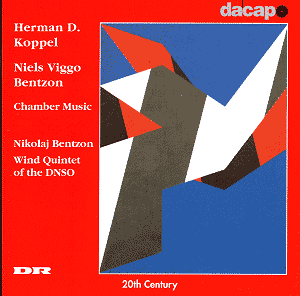Large ensemble chamber music from two of the
three pillars of Danish twentieth century music.
Koppel's wartime Sextet is ruthlessly
playful and sharply rhythmic in the A la marche first movement.
This contrasts with music that is alive with Gallic sentiment
except when occasionally leaning towards the pastoral idylls of
Nielsen. The second movement is a gift of pastoral expression
tapping into the tradition of Danish rustic song mingled with
onomatopoeic birdsong. The writing, which is full of ruddy life,
is tart but never betraying any dissonance. The lively piano work
in the finale has a jazzy overtone - Ravel meets Nancarrow. This
is a work you will want to return to repeatedly ... and not from
any sense of duty.
The Bentzon Sextet is for the same ensemble
forces as the Koppel. It was a commission of the Esbjerg Ensemble
who premiered it on 31 March 1972. Like the Quintet you occasionally
catch glimpses of Nielsen but mixed in are hints of the anarchic
Shostakovich, protesting dissonant punctuation and a again certain
ruthlessness. The piano's hoarse full-stop at the end of the slow
calm of the Largo is memorable. This leads to the switchback
Allegro finale which yet finds time for romance in the
over-melody contributed by the horn at 3.01.
Bentzon's Op. 116 Wind Quintet is
mournful and haunted by comparison with Koppel. While Koppel's
Sextet bears the impress of Gallic jollity, jazzy entertainment
and the Danish lyric stream, Bentzon here writes music that is
aware of a much more inimical world, full of uncertainty and a
fate that is not necessarily benign. It is all determinedly tonal
but even the upbeat finale seems overhung with storm clouds.
The playing is topflight and although it is invidious
to single anyone out I was impressed by the designedly hollow
flavour of the oboe playing of Max Artved at the start of the
finale of the Bentzon Quintet. As for recording quality this is
warmer and slightly more 'hazed' than I am used to from this source
but agreeable nonetheless. The extensive background notes are
by Bertel Krarup.
The pianist is the son of the composer and the
recording sessions took place during the year of the composer's
death. Nikolaj Bentzon studied piano with his father and then
with Anker Blyme, himself an authoritative interpreter of Bentzon's
music who recorded an anthology for Danacord and this is reviewed
here.
The Koppel is the easy winner but the two Bentzon
pieces will reward persistence.
Rob Barnett
See also review
by Dave Billinge
